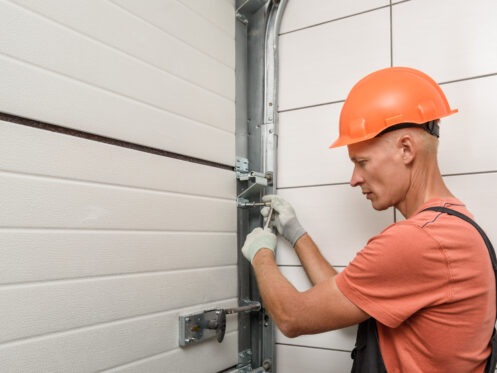Whether a natural disaster occurs or a thief breaks in, a homeowners insurance policy protects you against many issues. While this type of insurance offers a large amount of coverage, there are some things it doesn’t cover. If your garage door has recently been damaged, you might be wondering if you have coverage. To understand the extent of your coverage, you should first know how homeowners insurance works.
Understanding Homeowners Insurance Coverage
Before an accident occurs or a storm rolls through, you should gain a better understanding of your insurance policy and the amount of coverage it provides. Most homeowners insurance policies are customizable, which gives you the opportunity to make changes if you’d like to have more coverage for your garage door. However, most types of garage door damage are automatically covered by insurance.
Should You File a Claim?
Every insurance policy differs, which is why you should read through your policy details before deciding to file a claim. In many scenarios, the best option is to file a claim as soon as you can. However, some insurance providers include high deductibles with their policies, which means that you would need to pay some money for repairs before coverage kicks in. Before filing a claim, weigh the deductible against the estimated repair costs to determine if filing a claim is worth it.
Damage Covered by Homeowners Insurance
Your homeowners insurance policy should provide coverage for many causes of damage to your garage door. Here are some examples.
Fire Damage
Whether you leave the stove on or a spark is produced from faulty wiring, there are many causes of a house fire. If a fire develops in your home and damages your garage door, your policy should cover the damage or the cost of a replacement door. Coverage for wildfires may not apply.
Natural Disasters
When a garage door is damaged during a natural disaster, the insurance policy should provide coverage. However, not all disasters are covered. If the damage is caused by a lightning storm or extreme winds, the policy should pay for repairs. You might need to pay for extra coverage if you want to extend your policy to other natural disasters.
Car Damage
When your car is parked inside your garage, the coverage you receive for a damaged car or garage door depends on what caused the damage. For example, let’s say that you or a family member backed into your garage door and damaged one or more of the panels. In this scenario, the majority of homeowners insurance plans provide coverage, even if the damage was caused by one of your vehicles. However, the damage done to your vehicle will need to be covered by a car insurance policy.
In the event that another individual runs into your door with their own vehicle, the driver’s car insurance policy should cover the repairs to your garage door and the vehicle inside. Keep in mind, however, that there are usually limits on the amount of liability coverage someone has. When the repair costs are higher than the coverage, your homeowners policy should cover the difference.
There’s also a chance that your garage door will be damaged by a driver who doesn’t have insurance or by someone who leaves the scene before you can get their information. In this case, your homeowners insurance policy will likely cover the damage.
Vandalism
If someone damages your garage door intentionally, your homeowners insurance policy should cover it. For example, repairs are covered if an individual hits your door with a baseball bat or paints it. When the issue is caused by a criminal act, your insurance provider may require that you first file a police report before making an insurance claim.
Theft
Most insurance policies cover damage to a door that’s caused during a break-in. If some of the belongings inside your garage are stolen, they might also be covered by the policy.
Damage Not Covered by Homeowners Insurance
Before you start filling out an insurance claim, keep in mind that there are some issues that aren’t covered by a homeowners insurance policy.
Standard Wear and Tear
Garage doors are invariably exposed to the elements, which is the main reason why they become worn down with age. Small dents and faded paint are the most common issues. If your garage door is impacted by general wear and tear, small repairs for these issues likely won’t be covered by an insurance policy.
Specific Natural Disasters
Even though the damage caused by most natural disasters is covered by a homeowners insurance policy, some natural disasters might not be covered. Depending on where you live, it’s possible that you’ll need to pay for repairs if the damage was caused by wildfires, flooding, or earthquakes.
Intentional Damage
If your garage door was intentionally damaged by you, you won’t receive coverage for any repairs. To make sure you didn’t cause the damage, your insurance provider will likely require proof that the damage to your garage door was caused by something that you couldn’t avoid.
What the Claims Process Entails
If you’ve determined that repairs to your garage door will be covered by your insurance policy, the next step is to file a homeowners insurance claim. This process can be lengthy but is straightforward.
Start the Claims Process
The first step in the claims process begins by making a claim, which is done by contacting the insurance company in question. Reporting the damage soon after it occurs makes it more likely that the problem will be properly resolved.
Once you reach a claims professional, they’ll likely ask you what happened. After discussing the events, the professional may give you information about what your insurance policy covers. They’ll likely schedule a time when someone from their office can come and inspect the damage as well.
Homeowners can document their losses with videos or photos, which can be helpful to provide visual evidence. Every item that’s been damaged in and around the garage should be noted.
Resolving the Claim
The amount of time it takes for the claims process to be completed can vary substantially. In most cases, the amount of damage that’s occurred will dictate how long the claims process takes. Once the claims professional inspects the damage and records the details of the loss, they’ll take some time to review the claim and calculate potential damages. If your insurance provider determines that your existing policy covers the damage, you’ll likely receive a check that covers the insurance provider’s estimate of this damage.
Do you need to have your Louisville, KY garage door repaired? If so, our technicians at Lewis Door Service can quickly diagnose any problem that’s impacting the functioning of your door. Once we identify the problem, we’ll provide the necessary repairs and replace any damaged parts. Whether your garage door opens too slowly or it doesn’t open at all, we’re here to help. We also offer garage door replacement and maintenance services. Call Lewis Door Service today to tell us more about the problem you’re having and schedule our repair services.

